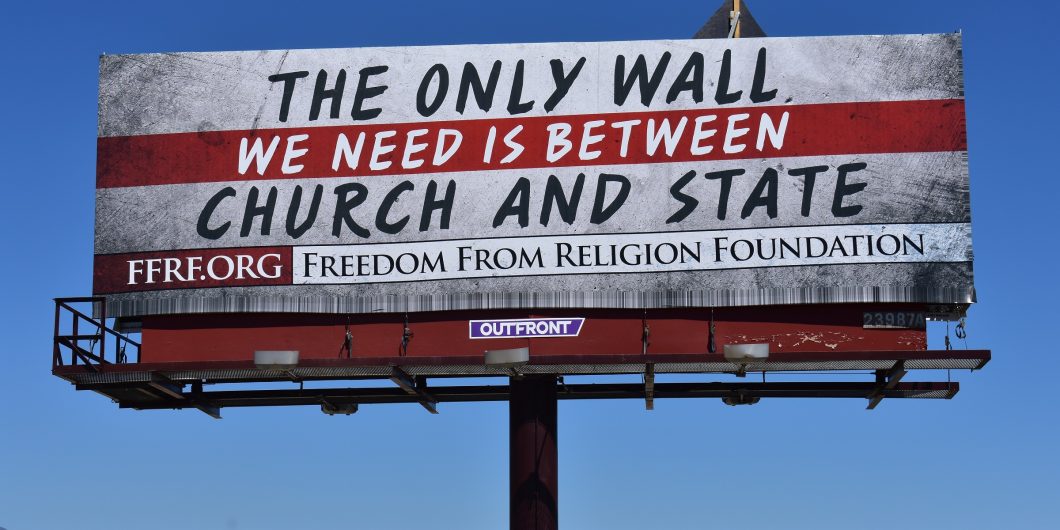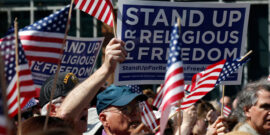The Religious Liberty in the States project creates an objective index that measures and compares how well states protect religious freedom.
Secularism’s Irrational Animus
I started reading Linda McClain’s Who’s the Bigot? with great expectations, hoping that she would offer a fresh and incisive view of an old subject—racial and religious bigotry. I finished the book disappointed, not because I didn’t learn anything along the way—far from it. But for someone—nay, anyone—who takes the religious side of the religion and politics conjunction/disjunction seriously, McClain’s approach to the subject underwhelms, in large measure because she treats religion merely as a possible motive for political behavior, not as a matter of deep-seated conviction that involves discerning the truth about God, with the fate of one’s immortal soul at stake. Most social scientists might be satisfied with her account of the way claims and counter-claims of bigotry have been deployed in our various civil rights controversies over the past decades, but that would say more about the ultimate limitations of social science than about anything else.
McClain, the Robert Kent Professor of Law at Boston University, treats past discussions of interfaith and interracial marriage, as well as the debates over the desegregation of schools and public accommodations, to illuminate our current contretemps regarding same-sex marriage and the wedding industry. We learn a lot about the debates at large and in the narrower legal circles (i.e., in the lower court opinions and amicus briefs), with a special focus on the way the rhetoric of bigotry was and is deployed on both—or is it all?—sides of the controversies.
Given her subject and the manner in which she proceeds, which relies on her claims regarding the commonalities between interreligious and interracial marriage, on the one hand, and same-sex marriage on the other, the general thrust of McClain’s argument is clear. As we make moral progress (something of which she appears to be confident), the old narrow prejudices will recede. Over time, thanks to more education and more contact, Catholic suspicions of Protestants, Protestant suspicions of Catholics, and “everybody’s” (Tom Lehrer’s expression) suspicions of Jews have diminished. Once the legal barriers to interracial marriage were dismantled, the religious arguments that upheld them were discredited and abandoned. Our children and grandchildren, McClain expects, will regard religious defenders of traditional marriage the same way we regard those who grounded their opposition to interracial marriage in scripture.
There are plenty of reasons to doubt and object to McClain’s argument here. First of all, it’s not obvious, especially from the point of view of orthodox religion, that moral progress consists in secularization and the rubbing away of religious distinctiveness. Second, if bigotry is the issue, surely there are bigotries other than those associated with religious belief and race. Secular views may well have bigotries all their own. For evidence of this, we need look no further than the anti-Semitism that is rampant in the academy and the hostility that some Democratic Senators have recently displayed against traditional Roman Catholic judicial nominees. (I sometimes wonder if McClain’s attempt to diminish the deployment of charges of bigotry is intended as much to insulate the secular Left as it is to pour oil on troubled waters generally.) Finally, again from the point of religious orthodoxy, there is a vast difference between defending the propagation of the faith through the family and engaging in racial discrimination. Only a social scientist who pays no attention whatsoever to the logic of the positions being articulated could ignore or discount the difference. Of course, McClain could defend herself here by arguing that she’s not making those kinds of “value judgments,” but they are pretty close to the heart of any authentic religious experience. Not taking them seriously makes it impossible to understand religion and to distinguish between genuine and pretextual uses of religious rhetoric.
Stated another way, McClain’s social science encourages religious obtuseness. Indeed, such religious obtuseness fuels the very charges of bigotry that she deprecates. I asserted a moment ago that she expects our children and grandchildren to treat the religious defense of traditional marriage in the same way as we treat the “religious” defense of objections to interracial marriage. This is only possible if you treat religion as a cultural or social phenomenon, not as a religious phenomenon, if you don’t attempt to understand religion as it understands itself. Thus I’m tempted to argue that McClain’s approach gives birth to the very claims of bigotry that she then attempts to defuse. This is clear enough from a consideration of the events leading up to the Masterpiece Cakeshop decision, where members of the Colorado Civil Rights Commission felt no compunction about regarding religious opposition to same-sex marriage as merely pretextual, as an ideological cover for pure prejudice and bigotry.
McClain wants us to be a bit more subtle than that. Like Justice Anthony Kennedy—in many respects her hero in the Court’s treatment of gay rights and same-sex marriage—she seems willing to concede the seriousness and sincerity of religious opponents of same-sex marriage. They—at least some of them—are not mere haters. But as she reads the First Amendment Free Exercise Clause, these serious and sincere beliefs do not require legislative accommodation. Nothing prevents a state from enacting a religious freedom restoration act (a consideration curiously absent from her treatment), but, on her understanding, the American tradition is exemplified by this passage from George Washington’s letter to the Hebrew Congregation in Newport, Rhode Island: “the Government of the United States… gives to bigotry no sanction, to persecution no assistance.” To be sure, what it means to be a bigot is very different now than what it meant in 1790, when Washington wrote the letter.
Furthermore, it’s not clear that McClain’s conception of the appropriate governmental stance toward bigotry (whatever it means) is the same as Washington’s. Not only is there nowhere in her book a reference to Washington’s “Farewell Address,” where he characterizes religion as an “indispensable support” of political prosperity, she tellingly does not (and I think could not) cite the previous sentence in the letter, which refers to the exercise of our “inherent natural rights.” In Washington’s view, government is to respect our natural rights (which include the free exercise of religion) and we, in turn, are to “demean [ourselves] as good citizens, in giving to it on all occasions [our] effectual support.” This is a much more limited vision of government than is conceivable in the post-Civil Rights era. Where Washington stood for the proposition that we should all be left alone to exercise our “liberty of conscience” as a matter of right, not as an indulgence of toleration, McClain would have some of us by legal right make demands on others, even if those demands trench upon our liberty of conscience. Through the happy alchemy of changing sentiment and creative judicial review, the dross of negative liberty is transmuted into the gold of positive liberty. The authority of Washington’s articulation of our tradition serves only as a vessel for McClain’s new meaning.
Her expansive view of government and crabbed view of religious liberty enables her to seem generous in strategically eschewing the rhetoric of bigotry. Religious traditionalists can believe whatever they want, but they cannot be permitted to have any influence on public policy. This poses a certain challenge to the social contract by means of which we have long secured our toleration and peace. When I lose a political conflict according to the ordinary rules, I can reconcile myself to that defeat because I can look forward to a time when circumstances might change and I might win. But McClain would have the losses inflicted on religious traditionalists be permanent losses, with no prospect of returning to the arena, thanks to the Supreme Court’s discernment of the new meaning of our constitutional heritage. This is a necessary consequence of the Romer decision, another Kennedy accomplishment celebrated by McClain, where some majorities—those at the state level in Colorado acting out of an “irrational animus” against homosexuality (not, at that point, treated as sincere religious belief)—can’t have their way, while others in some local jurisdictions (those wishing to extend protections to gays) can. There are thus fewer reasons to make one’s peace with this arrangement, with the consequence that we’re already seeing in the recent rise of integralism among conservative Catholics and in others’ embrace of a populism hardly consistent with the forms of religious traditionalism.
In the end, McClain’s blindness to the ultimate significance of ultimate truths leads her to miss something no genuine social scientist should miss.
Where secular progressive elites alter the rules of the game so that traditionalists—elite and non-elite alike—cannot prevail, the likelihood that the latter will reject the game out of hand increases. In one sense, this is nothing new, even in recent times—consider the First Things symposium on “The End of Democracy,” which posed the question of “whether we have reached or are reaching the point where conscientious citizens can no longer give moral assent to the existing regime” back in November 1996. I am dispositionally and in principle disinclined to alarmism, but when Rod Dreher’s “Benedict Option” seems the most plausible and least scary response to “moral progress” as described by Linda McClain and increasingly entrenched by our courts, we are not in a good place—one much closer to 1776 or 1861 than many of us would like to be.
This may not concern McClain, who may be confident that the marginalization of religious traditionalism will simply proceed apace. What’s more, she seems to offer no account of religion that would lead anyone to devote himself or herself to any particular moral or theological vision. Religious belief can presumably evolve in much the same way as our political and constitutional principles, with nothing in particular at stake in preferring one interpretation of scripture or theological view to another. Those who hold such views because they think them true and really believe them have to be regarded as sources of the simply irrational animus that Anthony Kennedy deprecates when he’s not seeming magnanimous in a victory he confidently assumes is permanent.
I began this review by saying that I learned a great deal from McClain’s book. Above all, she provides an extensive apologia for Anthony Kennedy’s jurisprudence. To put it another way, she expresses very well an elite law school-based attitude toward the kinds of beliefs not often encountered in those precincts. I suppose that serious traditional religious believers ought to be at least a little grateful for his and her strategic willingness to tone down some of the vitriol directed against them by our secular elites. I’m not convinced, however, that all too many of her readers will follow her advice.
In the end, McClain’s blindness to the ultimate significance of ultimate truths leads her to miss something no genuine social scientist should miss. If the arc of history doesn’t bend toward secular progressivism, if traditional religion won’t just fade away (to be regarded as a backward curiosity by our grandchildren, who won’t be able to believe that anyone ever believed such benighted nonsense), then moralistic therapeutic non-theism (to adapt sociologist Christian Smith’s phrase), practiced and promoted by an anti-orthodox version of the so-called anti-racist educator Robin DiAngelo (approvingly cited near the end of the book) will not, or at least may not, work. Religious truth is not merely a cultural phenomenon, to be shaped by those who designate themselves as our thought leaders. And so, I will not be surprised if they are surprised by the persistence of the (no hashtag here) resistance to our brave new world. I hope and pray that that resistance be both reasonable and loving.


